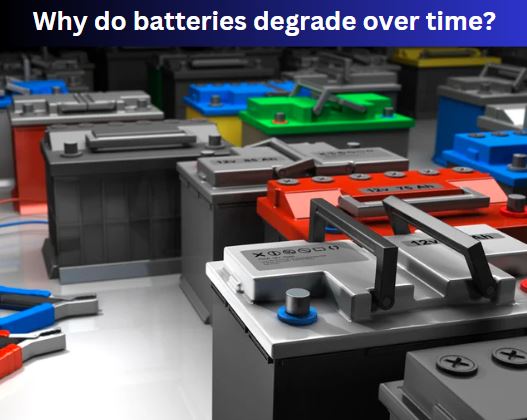Why do batteries degrade over time?
Answer:
Batteries degrade over time due to chemical reactions that reduce their ability to hold a charge, such as the formation of solid electrolyte interphase (SEI), loss of active material, and growth of dendrites.

Complete reasoning:
Batteries degrade over time because of several interconnected chemical and physical processes:
- Formation of Solid Electrolyte Interphase (SEI): During the first few charging cycles, a protective layer forms on the anode to prevent further electrolyte decomposition. However, this layer can grow thicker over time, consuming lithium ions and reducing the battery’s capacity.
- Loss of Active Material: Repeated charging and discharging cycles can lead to the breakdown of the cathode and anode materials, reducing the number of lithium ions that can be intercalated.
- Growth of Dendrites: Metallic lithium can deposit unevenly during charging, forming needle-like structures called dendrites. These can pierce the separator between the anode and cathode, causing short circuits and potential battery failure.
- Electrolyte Decomposition: The electrolyte can degrade over time, especially at high temperatures or voltages, leading to a reduction in the battery’s ability to transport ions.
- Thermal Degradation: High operating temperatures accelerate the degradation of battery components, leading to faster capacity loss and potential safety hazards.
FAQs:
What causes batteries to degrade?
Chemical reactions, material breakdown, and thermal effects.
How does temperature affect battery life?
High temperatures accelerate degradation, while extremely low temperatures reduce performance.
Can battery degradation be reversed?
No, it is a permanent process, but proper care can slow it down.
How long do typical lithium-ion batteries last?
Usually 2-3 years or 300-500 charge cycles.
What is the solid electrolyte interphase (SEI)?
A protective layer on the anode that forms during the initial cycles but can grow and consume lithium ions over time.
Why do dendrites form in batteries?
Uneven lithium deposition during charging leads to dendrite formation.
Does fast charging affect battery life?
Yes, it can increase temperature and stress, accelerating degradation.
Can I slow down battery degradation?
Yes, by avoiding extreme temperatures, overcharging, and deep discharging.
What happens when a battery reaches its end of life?
It can no longer hold a significant charge and may need to be replaced.
Is battery degradation a safety concern?
Yes, severe degradation can lead to swelling, leaks, or even fires.
Related Questions:
What Happens if a Battery is Connected to the AC Supply?
Is a Charged Battery Heavier Than a Depleted One?
What Happens If I Touch Both Terminals Of A 12V Battery?
What happens if you touch a negative side to a battery of positive side?
What Happens if a Battery is Connected to the AC Supply?
What will happen if a phone battery is overcharged?
Do you think the 20-80% rule is as effective as people say to extend your battery life?
 Electrical Engineering World Wiring a Brighter Tomorrow!
Electrical Engineering World Wiring a Brighter Tomorrow!